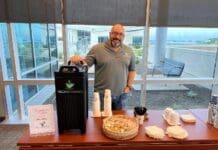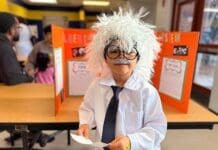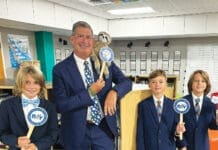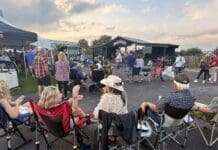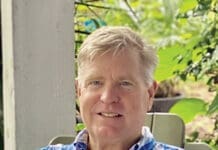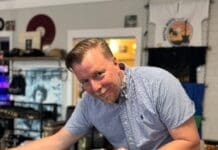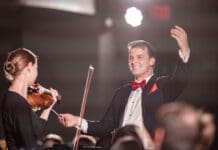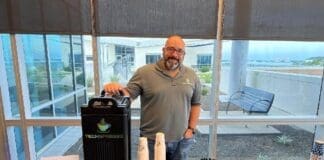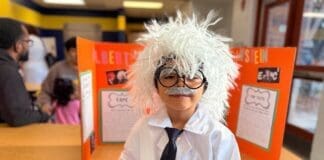By Rick Moore
While spending time with my son in Boulder, Colorado, I visited a state park at the foothills of the Flatiron Mountains. Near the park entrance was a sign with the words “Chautauqua Park.” I had seen the word Chautauqua on signs in Defuniak Springs, Florida, which is just thirty minutes from my home. I wasn’t sure what the word meant or where the word came from. I asked someone in the Visitor Center of the Colorado Chautauqua if it was related to the Chautauqua in Florida. She gave me a brochure detailing the history of the Chautauqua Movement. This really sparked my curiosity, and I began researching.
Chautauqua is a county in the northwest corner of New York where, in 1874, a Methodist minister and a businessman joined forces to create a camp to educate Sunday school teachers in the areas of art, education, recreation and religion. Although it started in New York, a few years later it moved to Florida, and then sprouted up across much of the nation. The Chautauqua in Defuniak Springs was so popular that several Presidents of the United States came to speak at it. Theodore Roosevelt, who spoke twice at the summer gathering, said, “Chautauqua is the most American thing in America.” Thousands attended, with many staying for weeks at a time.
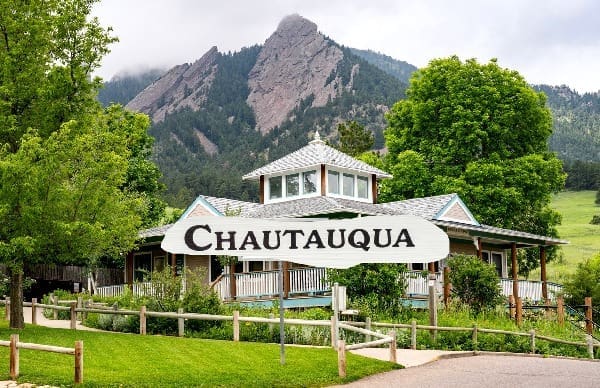
Records reflect that in the early 1900s at a typical Chautauqua, campers learned Latin or French, listened to Beethoven or ragtime, and sampled lectures on literature, art, science and history. Americans who had never studied chemistry saw frozen CO2 and other wonders. Chautauqua also started America’s first book club, the Chautauqua Literary and Scientific Circle. This movement thrived on American curiosity. It became so popular that it spread west to Boulder, Colorado. Today, the Chautauqua in Florida and in New York seem only a token of their glory days. Though there are still annual festivals at locations across the nation, with the advent of radio and television, the Chautauqua Movement lost most of its influence. That is, except for the Boulder location. The Colorado Chautauqua continues to thrive. Visiting there brought me back to a time when learning was very different. This hands-on approach to education is the very opposite of Artificial Intelligence (AI).
AI is the number one news story of this year. I like Artificial Intelligence, but it should never replace non-Artificial Intelligence that is natural and organic. Think about the word artificial for a moment. Artificial sweeteners used to be advertised as superior to natural sweeteners. We now know that is not true. Even our animals can suffer from artificial synthetic ingredients and artificial additives in their food. My wife makes her own dog food because she has seen firsthand what artificial ingredients can do to our pets. When I see the word artificial, a red flag goes up. If feeding our bodies artificial ingredients is harmful, what does Artificial Intelligence do to our minds? What we feed our minds is no different conceptually from what we feed our bodies. Artificial Intelligence can be great, but it should not be a replacement for natural intelligence. Seeing an exotic flower grow on a mountainside is very different than seeing a picture of it on the internet or even with the latest virtual goggles.
If you can’t make a trip to the Colorado Chautauqua to enjoy the current offerings of activities, I have a suggestion: There is a local attraction that in many ways carries on the spirit of the Chautauqua. It is the E.O. Wilson Biophilia Center located on Highway 20 East in Freeport. Be sure and check the days and times it is open to the public. Perhaps you can go visit a zoo or aquarium soon. The Artificial Intelligence you get from a VR Headset can never match the experience of being out in nature. The noise my sound machine makes at night is nice, but it will never replace the sound of the waves I hear while sitting on the beach. When you can, go natural.
Rick Moore is Communication Pastor at Destiny Worship Center.

